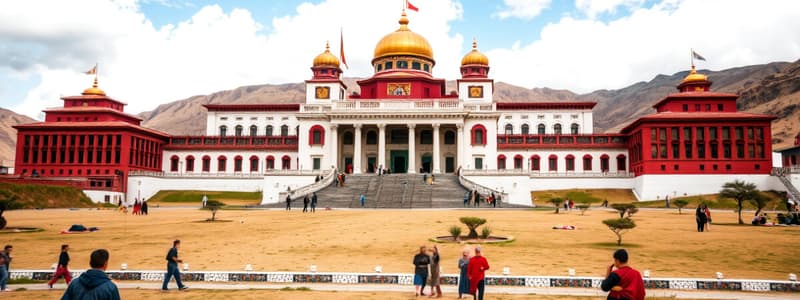Podcast
Questions and Answers
What is the main aim of the Resolve Tibet Act?
What is the main aim of the Resolve Tibet Act?
- To strengthen China's claims over Tibet
- To promote a peaceful resolution to the Tibet-China dispute (correct)
- To provide financial support to the Chinese government
- To promote military action in Tibet
The Resolve Tibet Act supports the Chinese government's position on Tibet.
The Resolve Tibet Act supports the Chinese government's position on Tibet.
False (B)
What rights does the Resolve Tibet Act underline for the Tibetan people?
What rights does the Resolve Tibet Act underline for the Tibetan people?
Self-determination and human rights
The Tibetan Policy Act was established in the year __________.
The Tibetan Policy Act was established in the year __________.
Match the following acts with their respective years:
Match the following acts with their respective years:
What is one of the illegal actions listed regarding public examinations?
What is one of the illegal actions listed regarding public examinations?
The new law regarding exam integrity allows for imprisonment for up to 10 years.
The new law regarding exam integrity allows for imprisonment for up to 10 years.
How many instances of question paper leaks were identified across the states in the last five years?
How many instances of question paper leaks were identified across the states in the last five years?
The Resolve Tibet Act aims to address the __________ between Tibet and China.
The Resolve Tibet Act aims to address the __________ between Tibet and China.
Match the following concepts with their descriptions:
Match the following concepts with their descriptions:
What is the expected financial penalty for violations related to examination fraud?
What is the expected financial penalty for violations related to examination fraud?
The Resolve Tibet Act was recently passed by the United States Congress.
The Resolve Tibet Act was recently passed by the United States Congress.
What provision does the new law have for future incidents of examination fraud?
What provision does the new law have for future incidents of examination fraud?
What is the primary purpose of the Resolve Tibet Act?
What is the primary purpose of the Resolve Tibet Act?
The Resolve Tibet Act allows dialogue only with the Dalai Lama as a spiritual leader.
The Resolve Tibet Act allows dialogue only with the Dalai Lama as a spiritual leader.
What did the 2002 Act encourage regarding the Dalai Lama?
What did the 2002 Act encourage regarding the Dalai Lama?
The Indus Water Treaty was established in the year _____ .
The Indus Water Treaty was established in the year _____ .
Match the following acts with their descriptions:
Match the following acts with their descriptions:
Which of the following did the Resolute Tibet Act NOT aim to do?
Which of the following did the Resolute Tibet Act NOT aim to do?
What recent event prompted the Pakistani delegation to visit Jammu's Kishtwar?
What recent event prompted the Pakistani delegation to visit Jammu's Kishtwar?
The Kishanganga and Ratle hydroelectric projects have not faced any objections from Pakistan.
The Kishanganga and Ratle hydroelectric projects have not faced any objections from Pakistan.
Flashcards are hidden until you start studying
Study Notes
Resolve Tibet Act
- The Act awaits President Joe Biden's assent for ratification into law.
- It follows two major pieces of U.S. legislation regarding Tibet: the Tibetan Policy Act (2002) and the Tibetan Policy & Support Act (2020).
- Aims to facilitate a peaceful resolution to the Tibet-China dispute based on international law and the UN Charter through dialogue without preconditions.
- Authorizes funds to counter Chinese disinformation about Tibet, including inaccuracies regarding its history and institutions, notably the Dalai Lama.
- Highlights Tibetans' right to self-determination and emphasizes China's obligations under two key covenants: the International Covenant on Civil and Political Rights and the International Covenant on Economic, Social and Cultural Rights.
Key Provisions
- Urges China to engage in direct dialogue with the Dalai Lama and democratic Tibetan leaders to seek resolution without preconditions.
- Amends the Tibetan Policy Act to clearly define the geographical area of the Tibetan Autonomous Region.
- Marks a shift from previous legislation by challenging China's claim over Tibet directly.
Comparison with Previous Legislation
- The 2002 Tibetan Policy Act recognized China's claim over Tibet, emphasizing dialogue only with the Dalai Lama as a spiritual figure.
- The Resolve Tibet Act requires engagement with the Dalai Lama as a political representative, highlighting the need for open discussions aiming to resolve differences.
Indus Water Treaty
- A five-member Pakistani delegation visited Jammu's Kishtwar to inspect hydroelectric projects affected by the Indus Water Treaty (IWT) of 1960.
- This marks the first inspection since the revocation of Jammu & Kashmir's special status in 2019.
- The inspection is set against ongoing Pakistani objections to the Kishanganga (330 MW) and Ratle hydroelectric projects, which impact water flow covered under the IWT.
Studying That Suits You
Use AI to generate personalized quizzes and flashcards to suit your learning preferences.



